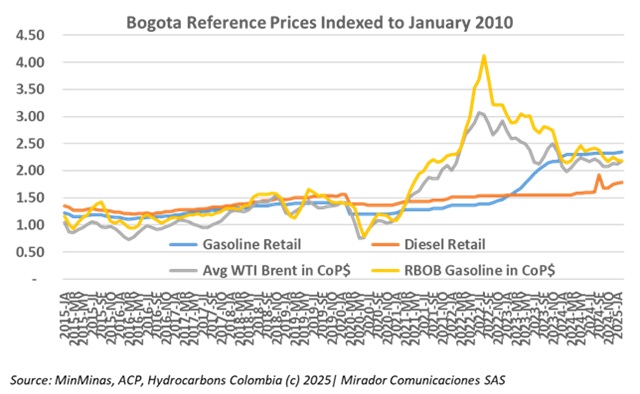The Colombian Association of Propane Commercialization (Agremgas) raised a serious warning about the widespread informality in the distribution of propane across the country. According to the association, this growing issue not only undermines service quality but also poses major risks to user safety, particularly for low-income households that rely heavily on this energy source.
The Fuel Price Stabilization Fund (FEPC), a key instrument to buffer domestic fuel prices against international volatility, is projected to end 2025 with a deficit of CoP$3.8T, its lowest since 2020, but still a significant burden on the national budget.

A controversial shift may be occurring in Colombia’s fuel subsidy system: experts claim that gasoline users are now indirectly subsidizing diesel consumers. This claim comes amid the Petro administration’s gradual dismantling of the fuel subsidy scheme that once cushioned consumers from global price fluctuations.
MinEnergia Edwin Palma says the Colombian government will write long-term gas import contracts because “Those increases in gas prices across the country must be reversed.” He is either misguided or misleading Colombians. We hope it is the former. Gas prices appear to be on the upswing and Colombians will pay a premium to eliminate the risk of gas prices going up.
Colombia’s new Finance Minister (MinHacienda), Germán Ávila, outlined a bold economic recovery plan aimed at stabilizing the country’s finances in the remaining months of President Gustavo Petro’s term.
Ecopetrol’s (NYSE: EC) Board of Directors approved funding and development for the “Quality Baseline Line” project, an initiative aimed at ensuring fuel production meets the highest quality standards, ultimately reducing pollutant emissions.
The National Federation of Biofuels (Fedebiocombustibles) announced the V International Biofuels Conference, the most important event in the sector in Latin America.

Nidia Hernández, president of Colfecar, shared insights into the challenges facing Colombia’s transportation sector.
Propane is the primary cooking fuel for millions of Colombians. It offers a cleaner alternative to firewood or coal which pose serious health and environmental risks. However, the propane sector is now facing a crisis due to the government’s failure to pay subsidies, a situation that could leave one million families without access to this essential fuel.
With a staggering market capitalization of US$1.6T, a net profit of US$106B, and a free cash flow of US$85B, Aramco’s potential entry into Colombia’s liquid fuel market has generated significant anticipation regarding its impact on the industry.